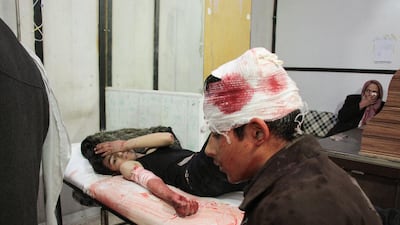An ongoing offensive by the Syrian government targeting the largest remaining piece of rebel-held territory in the country has displaced tens of thousands of people in recent weeks as winter weather sets in, and local officials say aid is scarcer than ever.
Many of those on the move in northern Syria's Idlib province have already moved multiple times to escape violence during the country's nearly seven-year-old civil war. They say intense Syrian and Russian airstrikes have caused much of the recent wave of displacement.
Russia has been supporting the government of Syrian president Bashar Al Assad since 2015, and after largely defeating ISIL in eastern Syria in recent months, Mr Al Assad and his allies have turned their attention towards the rebels that control most of Idlib.
Largely rural, Idlib borders Turkey to its north and was one of the first places where rebels took over significant swathes of territory. Most local aid groups estimate that there are more than 200,000 displaced people in the province.
“People are very afraid the regime with the help of Russia might storm Idlib, which contains huge numbers of civilians,” said Ali Abu Hussein, a refugee living in a camp called Al Qatra that he said houses about 700 families. “Were shall we go? We can't think of going to Turkey; the border is closed.”
Read more: Syrian government forces claim victories in Idlib offensive
Mr Abu Hussein is from Qasr Shawi, a village in eastern Hama province near the border with Idlib. He said all of the approximately 100 families from his village had left in mid-November, when the government captured the area.
The 37-year-old farmer and father of three children said his family had moved multiple times since then.
“Every time we flee to one area, the regime advances to that area and then we move again,” he said.
Near-freezing temperature are common in Idlib during the winter. Local groups provide aid on an ad hoc basis.
On Tuesday, Mr Abu Hussein said a local aid group had delivered food, mattresses and clothes, while another had brought some food and coal.
“We are in danger of moving again at any moment. There are already some families in this camp who are leaving towards other camps at the border, even as others arrive at this camp.”
Rayyan Al Ahmad, a representative of local governing councils in eastern Hama, said that while he was visiting Qatra Camp on Monday, 15 new families arrived from other areas.
Mr Al Ahmad said that after delivering some medicine to families in Qatra, he continued on to Atmeh, a camp that sits directly on the Turkish border. Established in 2012, it is Idlib's largest camp, with the lowest estimates putting its population at more than 50,000 people.
“People told me, ‘We want to go to Turkey. We will throw ourselves at the border and let them kill us. We won’t stay if the regime advances',” Mr Al Ahmad said. “Others told me, ‘We will continue to fight until we die, rather than surrender'.”
“Many people have started to move from the southern part of Idlib province to the city of Idlib,” said Mohammed Katoub, a spokesman for the Syrian American Medical Society (SAMS), which helps run dozens of medical facilities in the area.
Katoub said SAMS staff estimated at least 30,000 people had moved since the offensive began two weeks ago, with the trend accelerating in recent days.
"The main issue, as usual, is shelter. The governorate is already overloaded with IDPs [internally displaced people]," Mr Katoub said, though he also noted that the bombardment made the work of doctors more difficult and that some basic medical services had been suspended, including a vaccination campaign.
“We have had two attacks on health facilities in the north in the last 48 hours,” he said.
___________________
Read more
Syria year in review: Assad fixes his place as outside powers pursue their agendas
Syria year in review: remembering the Khan Sheikhoun chemical attack
___________________
Because of its border with Turkey, whose government has provided military and political support to the rebellion, international aid has regularly reached Idlib. But Muhammed Jafa, a local co-ordinator for aid efforts, said the amount of available supplies had dropped off in recent months.
“Some Qatari organisation have stopped their activity after the Gulf Crisis,” Mr Jafa said, noting that the prolonged nature of the conflict had left many people unable to support themselves. “There are large numbers of orphans and the handicapped who don’t have anyone to help them.”
Mr Jafa said that the presence of Hayat Tahrir Al Sham, a rebel umbrella organisation that is the strongest faction in Idlib, has also affected aid. Some groups within Tahrir Al Sham have links to Al Qaeda.
“Some organisations have restricted their activities to the minimum while others have stopped completely,” Mr Jafa said.
He said that despite the fighting, people fleeing the Syrian government were still arriving in Idlib from other parts of the country as well, either to join family in Idlib or because of fear of retribution by government forces.
"Every day, about 150 families reach the north of Syria coming from the east," Mr Jafa said, referring to areas that were recently recaptured by the government. "We are also receiving Iraqis. We have about 8,000 Iraqi refugees in our areas. They say they are escaping [militias] due to the sectarian conflict in Iraq."

